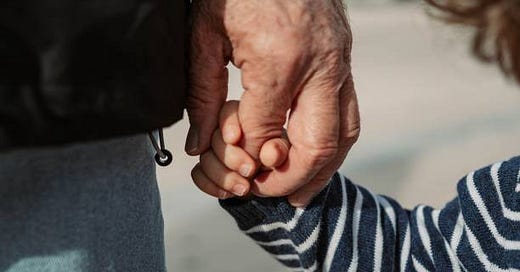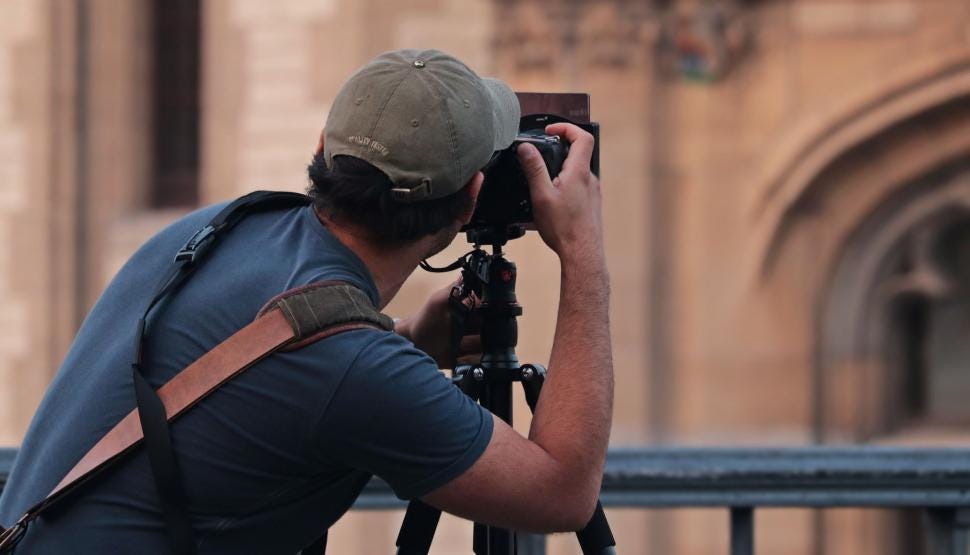I want to write about Muslim men. About the Muslim men I know. About the soft Muslim men I know.
I want to tell you about my Khalo, my mother’s brother, who bakes olives into his homemade focaccia and roasts whole garlic heads on the barbecue. Who won’t let you leave without a plate to take home, even when you only meant to stop by for 10 minutes. Who gets the first call when the furnace acts up, or the car light is blinking, or there are strange noises coming from the sump pump.
I want to tell you about my Baba, my dad, who shows up at the door with bags of pasta and boxes of mangoes because there was a special, and then shows up the next day with prickly pears and apple twists, and then shows up the day after that with a block of half-off Swiss cheese. Who can’t resist a sale. Who hates to eat alone. Who, when offered a cup of tea and a bagel with cheese, always, always asks, “Are you having some?”
I want to tell you about M, my husband, who will hate that I’m telling you about him at all. Who imagined and then willed an entire charitable organization into being on his evenings and weekends. Who has manifested theatre shows and literary festivals. Who treats vacations like marathons, and you better bring your walking shoes because you will take a bazillion steps a day. Who also knows how to slow down and stop every 6 minutes so he can take the perfect picture because it’s the perfect light. Who loves to surround us with a beauty that will tell our stories. Who has spent precious hours hunting for the wall art in our living room, whether it’s the Quran verses written in modern geometric calligraphy, or the photos of blue Moroccan doors.
I want to tell you about my Geddo, my mother’s father, who was a school teacher. Who read fiercely and widely and nurtured Mama’s love for debate. Who begged her not to wear hijab at university, because he knew the harassment she would endure — but saw her courage and conviction, the very things he’d taught her, and changed his mind. Who suffered Alzheimer’s when I was a child and died when I was a teenager. Whose presence I mourn because I only really know him from the stories, because by the time I was old enough to get to know him, he was gone, first to the disease and then completely.
I want to tell you about my brother-in-law, M’s brother, who has read more books and watched more movies and knows more references than anyone else I have ever met. Who sings while he’s unloading the dishwasher. Who watches the NBA like it's his job. Who plays with our boys with abandon, whether it’s tobogganing down winter hills or co-writing music or racing the last block home. Who still picks them up and lets them touch the ceiling even though they are 11 and 13. Who takes improv lessons.
I want to tell you about my Ammo, M’s father, who makes the best dinners. Who loves to watch Emeril on YouTube and try out the recipes. Who walks with me during my lunch hour whenever we’re visiting. Who taught me that the Arabic word for economy is iqtisaad, and the Arabic word for negotiations is mufawadat. Who tells me stories about Egypt in the 1960s and makes it a real place with real people, with nuance and beauty and heartbreak and promise, instead of the cartoon land I subconsciously imagined for most of my life.
I want to tell you that I see them all, my Khalo and my Ammo, my Baba and my Geddo, my husband and his brother, every time I hear about the rising death toll in Gaza. Conservative reports say 40,000 are dead, though civil society crumbled months ago and nobody knows what the real number is by now. I think of them every time I hear reports of yet another massacre.
“Fifty dead,” the reporter says on TV while I’m chopping onions for the stew, “including thirty women and children” And I think to myself, “What about the men? If all fifty were men, would we still report it? If all fifty were men, how many of those men would be Geddos and Ammos and Babas? If all fifty were men wouldn’t they matter too?”
I want to tell you that I think about them every time I hear an Israeli spokesperson saying how many “terrorists” have been “taken out” in so-called precision strikes and then I read about how every man, civilian or otherwise, is categorized as a terrorist. That I think about them every time I see a picture of Palestinian men face down in Israeli prisons, zip-tied hands behind their backs, vicious dogs snarling at their heads. Old men. Young men. Some so young they can’t even be called men yet.
I want to tell you that I think about them when I watch videos of Palestinian men in flip flops climbing through and around broken buildings, navigating disaster zones we wouldn’t dare enter without helmets and steel-toed boots. Palestinian men in threadbare clothes while the temperatures dip below freezing. Palestinian men with empty stomachs, digging someone’s child or mother or brother or sister or grandmother or grandfather or aunt or uncle out of the rubble with their bare hands for hours — day after day, explosion after explosion.
I want to tell you that I think of the Palestinian men each time I look at my boys. Who are so close to crossing that threshold into adulthood where they become brown men instead of children and in an instant lose all their humanity.
I want to tell you that I thought of them last week as I sat in my safe office building, wrapped in layers of clothing while I impatiently waited for the heat to turn on. That I thought of them again the next day when I arrived at a warm, comfortable place to work and again had plenty to eat.
I want to tell you so you will think of them too.
So you will picture the way Baba slices mangoes at our kitchen counter, the way Ammo holds a spoon of sauce up to me mid-recipe and asks, “More salt? More basil?” I want you to think of the olive skin that holds the dearest people in the world to me. I want you to know the texture of my boys’ hair that I twirled around my fingers when I rocked them to sleep night after night. I want you to imagine how the men in my life feed us, love us, care for us. And how my own boys will one day be men who walk through the world, eager to offer the same care.
I want you to think of them so that maybe, eventually, you won’t need to think of them to realize another man’s humanity, whether he is a Muslim in Gaza or Lebanon or just down the street. So that maybe, eventually, you’ll recognize that when we blindly substitute “terrorist” for “man” in news reports, you’ll catch the dehumanization and call it what it is: sinister and cruel, intentional. Maybe you’ll recognize that they deserve to live too. That they deserve dignity.
Every week I publish reflections from my lived experience as a visible minority. People like
, , and made today’s essay possible. If you’d like to support my work and join in thoughtful discussion about our world, consider upgrading today.







You are so gently brave and I love that.
I don't want to distract from your very important point specifically about the dehumanizing of Muslim men, but I hope you won't mind if I say that I also found in this a medicine for a different wound. I read a really toxic post several weeks ago about how ALL men are secret perverts leading or wishing to lead secret deviant lives. It was so vicious, and I wanted to respond that I was certain this was not true because of the many good men in my life, but I was silenced before I began by the knowledge that no matter what I said, the author could say, "You just think that because they're so good at keeping their terrible secrets." So thank YOU for this. I'm so happy to know about the lovely men in your life, as well.
Gushing over every line and sentence. I want to borrow each of these men here like a library book that I can’t promise I’ll return. I hope you send all of them this, my friend. Sometimes reading the words you don’t always hear makes all the difference.